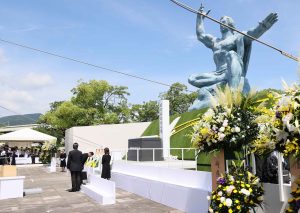For the Japanese, August is a special month. The first atomic bombing on human beings occurred in Hiroshima on August 6, 1945, and the second in Nagasaki on August 9. Then-Japanese Emperor Hirohito announced the surrender of Japan on the radio on August 15.
For Japan, then, August is a time to solemnly mourn the dead and to reaffirm the importance of peace.
However, this summer, a diplomatic spat is disturbing the serenity that normally marks this time of collective remembrance.
On August 9, the ambassadors of the United States and five other Western countries, as well as the European Union, skipped a peace memorial ceremony for atomic bomb victims in Nagasaki, protesting the city’s decision not to invite Israel to the ceremony. Notably, the six countries involved were Japan’s fellow Group of Seven members.
On the day, Nagasaki marked the 79th anniversary of the atomic bombing of the city. The two atomic bombings during World War II killed about 140,000 people in Hiroshima and 74,000 in Nagasaki, including victims who died from radiation exposure after the explosions.
For Nagasaki, its peace memorial ceremony on August 9 is the most important event of every year. the ceremony commemorates the victims of the atomic bomb and prays for lasting peace in the world.
Ambassadors from the U.S., the U.K., Canada, France, Germany, and Italy (all the G-7 nations except for Japan), as well as the Tokyo-based representative of the European Union, did not attend the ceremony. That was in response to Nagasaki Mayor Suzuki Shiro’s decision not to invite the ambassador of Israel.
“Given the critical humanitarian situation in Gaza and international opinion, there is a risk of unpredictable disruption occurring at the ceremony,” the mayor said at a press conference on June 3.
On August 8, one day before the peace ceremony, the mayor again denied any political motivation behind his decision and said that his only goal was holding the ceremony in a calm and solemn atmosphere.
Suzuki stressed the decision not to invite Israel’s ambassador was made after comprehensively considering the risk of unforeseen incidents such as demonstrations causing disruption.
The BBC reported that in June, “Suzuki said Nagasaki had sent a letter to the Israeli embassy calling for an ‘immediate ceasefire’ in Gaza.”
Nagasaki City usually invites all ambassadors in Japan to the peace ceremony every year. But it has not invited Russia and its ally, Belarus, since Moscow’s invasion of Ukraine in February 2022.
The ambassadors of the United States and the United Kingdom to Japan had called for an invitation to be extended to their Israeli counterpart, saying it was regrettable to put Israel in the same category as Russia and Belarus.
Instead of traveling to Nagasaki for the ceremony, U.S. Ambassador to Japan Rahm Emanuel attended the Nagasaki Atomic Bomb Victims Memorial Service held at Zojoji Temple in Tokyo’s Shiba Park along with British Ambassador to Japan Julia Longbottom and Israeli Ambassador to Japan Gilad Cohen.
Asked about his absence from the memorial service held in Nagasaki, Emanuel told reporters that since Prime Minister Kishida Fumio was also in attendance, he believed the non-invitation to Israel was a political decision, not for safety reasons as claimed by the city of Nagasaki.
In the end, the Nagasaki Peace Ceremony was attended by a record 100 countries and regions, including Palestine. Even the countries whose ambassadors were absent – including the U.S., U.K., and the European Union – sent lower-ranking diplomats to attend.
By contrast, Hiroshima City invited Israel to the Peace Memorial Ceremony held in the city on August 6, and the Israeli ambassador participated, as did Emanuel. Hiroshima didn’t invite Palestine to its peace ceremony.
Thus division in the international community over the Israel-Palestine conflict was reflected in two ceremonies in Japan praying for peace.
Many Japanese commentators have argued that both Russia and Israel should have been invited to the ceremonies in both Hiroshima and Nagasaki. Advocates of this approach say that the ambassadors of countries that are violating international humanitarian law and taking the lives of many civilians, including children, should have to learn the importance of peace.
Israel’s massive retaliation to an October 7 attack launch by Hamas militants from Gaza, a Palestinian territory, divided international opinions and sparked further conflict and worldwide protests.
The Israeli invasion of Gaza, a Palestinian territory, following the October 7 attack has so far killed more than 39,000 people, according to Gaza health authorities.

































